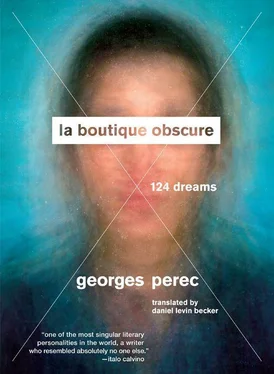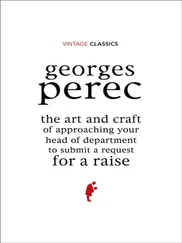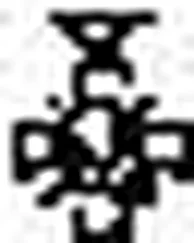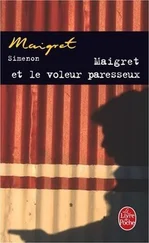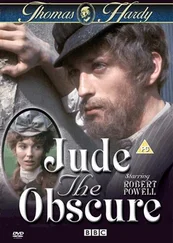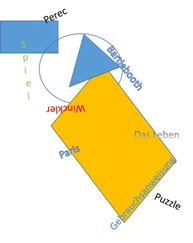Crossing? Tunnel?
In Paris, we look for a taxi. We have to cross a vast esplanade where the fascist “New Order” movement has organized an automobile gymkhana.
Seems to me we’re not far from the Bois de Vincennes …
The tomb
Time: around Christmas
Place: around Paris
slipping and sliding on kilometers of stonework with big protruding pebbles (puddingstone)
the kit (for repairs): it contains a “cutter,” a pastry punch, a hammer, a suitcase handle missing its screws …
the pun is a bear to get my bearings: a glass of bear!
In the distance, the towers from last night’s dream
We come to a town: Versailles.
Grotesque, police force, parade.
We are caught, in spite of ourselves, in the parade; it’s led by a drum major, an old flabby Belgian clown (Valentin the Boneless).
Finally we get to the cemetery. Commotion.
I find myself in front of a tomb where distant relatives of one of us (there are three of us, with shifting identities) are laid.
I bend over the grave.
There are portraits encrusted in the stone; one is of a Eurasian woman whom I recognize as Madame Vidal-Naquet, a famous psychiatrist of her time.
I feel tears rising to my eyes, and soon I am weeping abundantly.
A dream by P.:
The third person
I am standing on a hotel balcony (overlooking the sea? the Seine? the road?). A couple comes up. The woman asks for the phone book; she specifies that it’s white — maybe it’s the most recent edition — and that, since she knows it, she’ll have an easier time finding what she’s looking for. A woman who was standing next to me (the hotel manager?) gives it to her: it’s actually several unbound volumes that aren’t white.
Later, a whole section of the same balcony is occupied by diners. I am at a table with several people. At the next table is the woman from earlier (it wasn’t the hotel manager, just a guest like the others) with her husband: Mr. and Mrs. Cruel. Mrs. Cruel still has the phone book. I want to check something in it; I ask for the volume corresponding to the letter of the name in question, she seems to refuse; I explain to her what I want, and finally she gives it to me and I take it with a knowing look.
I flip through the “phone book,” which turns out to be a sort of Cruel family album. The frontispiece for a chapter in the middle of the book is a photo of the Cruels’ son. He is in the middle of a group of three: on the left, his father, who looks exactly like him, and who is a sort of cruel-looking Sami Frey, very brown, black eyes, thirty years old. The child must be about twelve; he seems kinder, blonder, his eyes are bluer. Suddenly I realize the photo is animated: the eyes are moving, the father’s look is extremely mean and filled with rage, and the son’s eyes are moving as well.
I am amazed by this effect. I turn the pages and I come to another animated photo: a corner of a room in which you see the corner of the bed and the curve of a large bowl decorated with characters, which I recognize as the Cruels’ Roman bath. The child — he is eight — is crossing through the space toward a door on the left side, half open onto darkness, which I know is the bathroom (I’m surprised the Cruels don’t use the Roman bath for the children, which seems perfectly suited to just that use).
Later, another dream.
Upon waking up, I remember the dream with the phone book and realize I do not know who the 3rd person in the first photo is — I don’t think it was the mother.
The condemnation
At Jean Duvignaud’s request, I set up a mailing list for people he wants to send offprint publications to.
P. and I are going away for the weekend to a fancy hotel, maybe the Ritz. We’ve booked two large apartments (or suites). We’ve brought so many bags (suitcases and hatboxes) that the busboys have to make two trips to bring everything up in the elevator.
In the elevator. It’s a huge elevator, as big as a bedroom. We are preemptively happy, almost smug, about our luxurious weekend.
In P.’s room. A huge room, some of which is taken up by a bar. A reception is going full steam there. A small child is shoveling huge spoonfuls of chili con carne into his mouth.
I go down to the restaurant. P. is sitting at another table, looking very pretty. J.L. is sitting not far from me. At one point, he leads me to a corner of the room and begins talking to me about an imminent landing in Cuba. I interrupt: he’s talking too much. The room is full of spies.
This is when an old woman, a witch, stands up, points at me, and shouts something like:
“We will be saved but he must die!”
At first I’m frightened, as though this threat is going to be realized on the spot, but then I comfort myself, convinced that it’s an abstract threat, a metaphysical certainty not yet defined in time. However, I have been hoisted onto a sort of pedestal and people have begun worshipping me, which is to say licking my feet. I have barely become accustomed to this ritual when I realize they’re actually trying to assassinate me by knocking me from the top of my pedestal. I end up falling, but I manage to hang on to the bumps on the wall (which is still dangerously slick) and I land uninjured on the floor. From way up high, people are bombarding me with enormous boulders, but none hits me.
I have fled into the high grass; I have met up with a horde and we have wandered for several years, several centuries, following animal tracks (maybe I knew how to find the passage about animals in the book?).
After long centuries of wandering, we come back to the regions we fled. On the steppe, a city has been built. It is called Texas. We see firearms for the first time …
Texas is a new city, made of wooden houses. Mostly saloons. The town hall, where a meeting is about to be held, is in a back room between two saloons. This arrangement is rather surprising at first, but you realize quickly that it’s actually quite clever.
La Bibliothèque nationale
I’m working in the large reading room at the library. Alain G. comes and sits down at a table next to mine.
At the Kuntz restaurant
I am at the Kuntz restaurant. I call over an old man with white hair (a sort of maître d’) and a young waiter who — blocking the passage of another, older waiter who has to go to miraculous lengths not to spill anything while serving the neighboring table — brings me a text that I finally identify as a pastiche of “la fabrique du pré” (not exactly a pastiche, nor a copy, more of a text for which “la fabrique du pré” is the source text).
Next to us, there is a box of “After Eight” chocolates.
The play
… and perhaps the play has already begun and, after a little while, I realize (or remember) that I’ve gone to the suburbs to see it, that I know the actors and the director personally and that, to put it on, the producers might have found money to borrow — maybe 20,000 francs — in Dampierre.
Читать дальше
